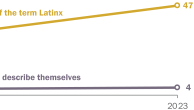Many Americans were puzzled or irritated by the questions about race and Hispanic ethnicity on the 2010 Census form. Some did not want to declare a race, others did not think they fit the available categories and still others wondered why the government should ask the question. Kenneth Prewitt, who directed the Census Bureau during the 2000 Census, also has concerns about the way the government asks about race and ethnicity. The race question on the census form “does not work well and we can do better,” he writes in a commentary in USA Today.
Instead of the two questions about race and Hispanic ethnicity, Prewitt suggests that the next census ask the following: “What national origin, ethnicity, tribe, language group or ancestry do you consider yourself to be? (List all those important to you.)” This question, he says, could be paired with others on immigration status: “Where were you born, and where were your parents born?”
Prewitt, professor of public affairs at Columbia University, says that a race question must be asked in order to shed light on disparities and discrimination based on color, ancestry or immigrant status, “but only if we draw the portrait more carefully than that produced by the 2010 Census.” He argues that his suggested questions allow people to define their own identities (which can include multiple races) and at the same time allow statisticians to group people into categories for comparison purposes. The immigration question, when paired with the race question, “tells us how immigrant status interacts with national origin, ethnicity or language group” so it can be seen how well newcomers are faring, he writes.
The race and ethnicity questions on the census form were assembled in response to specific demands over time, he argues, rather than being carefully designed to “provide information relevant to the public purposes that justify asking the questions in the first place.” (For additional background, see this history of racial categorization in the census and this history of counting Hispanics.)
Prewitt, who has a long-standing research interest in racial classification, also has argued his case in academic journals (such as this article from Daedalus in 2005 that suggests a less dramatic rewrite of the race question). He is writing a book about race and racial classification.




